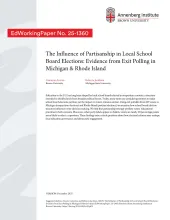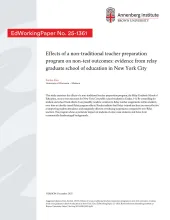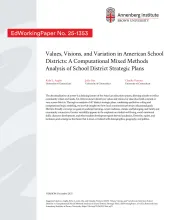Follow the User Guide to start building your site.
NEW EdWorkingPapers
The Influence of Partisanship in Local School Board Elections: Evidence from Exit Polling in Michigan & Rhode Island
Education in the U.S. has long been shaped by local school boards elected in nonpartisan contests, a structure intended to shield schools from broader political forces. Today, many states are considering reforms to make school board elections partisan, yet the impact on voters remains unclear. Using exit poll data from 839 voters in Michigan (nonpartisan elections) and Rhode Island (partisan… more →
Effects of a non-traditional teacher preparation program on non-test outcomes: evidence from relay graduate school of education in New York City
This study examines the effects of a non-traditional teacher preparation program, the Relay Graduate School of Education, on non-test outcomes for New York City public school students in Grades 3–8. By controlling for student and school fixed effects, I use plausibly random variation in Relay teacher assignments within students over time to identify causal Relay program effects. Results… more →
Assessing Permanent School Closures: A Conceptual Framework
Amid widespread declining enrollment, the expiration of COVID-19 ESSER funding, and looming uncertainty in federal P-12 education involvement, many school districts may soon consider permanent school closures. While extant permanent school closure literature provides a starting point for future analyses, it often fails to advise the breadth of contexts in which future closures may occur,… more →
Comparative Fiscal Architecture: A Two-Axis Framework for Understanding Educational Inequality Across Tax Jurisdictions
This paper introduces a structural, mechanism-based framework for understanding how inequality in education emerges from fiscal design rather than from demographic patterns alone. I propose a Two-Axis Fiscal Architecture in which educational opportunity is shaped by (1) horizontal flows of capital across tax jurisdictions (the X-axis), divided into cross-border movement (X1) and cross-regional… more →
Online Tutoring, School Performance, and School-to-Work Transitions: Evidence from a Randomized Controlled Trial
Tutoring programs for low-performing students, delivered in-person or online, effectively enhance school performance, yet their medium- and longer-term impacts on labor market outcomes remain less understood. To address this gap, we conduct a randomized controlled trial with 839 secondary school students in Germany to examine the effects of an online tutoring program for low-performing… more →
Values, Visions, and Variation in American School Districts: A Computational Mixed Methods Analysis of School District Strategic Plans
The decentralization of power is a defining feature of the American education system, allowing schools to reflect community values and needs. Yet, little is known about how values and visions for education hold constant or vary across districts. Through an analysis of 617 district strategic plans, combining qualitative coding and computational topic modeling, we provide insight into how local… more →
Policy and Practice Series
Webinar Series
The Bigger Picture: Key Trends in America’s Changing Education Landscape
Are the enrollment and achievement declines we’re seeing just pandemic fallout, or something deeper? The papers featured in this webinar provide essential context for evaluating common narratives about recent changes in student achievement and enrollment.





